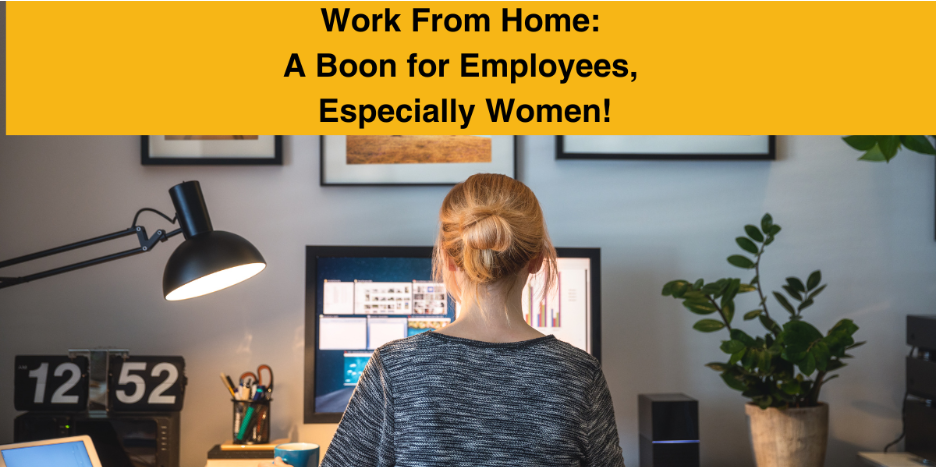Work From Home: A Boon for Employees, especially Women
The greatest boost a growing economy can get is through more and more inclusion of women into the paid workforce. Women’s economic and financial inclusion in society narrows down the gender gap in any work culture and improves teamwork and productivity. The pandemic situation of 2020-2021 has paved the way for counting in more women into the workforce by providing work-from-home opportunities to them in different fields. This work-from-home opportunity is especially a boon for the women workforce in India who either want to pursue their present career or restart a new one in the future.
“In this Amrit Kaal, the labour ministry is preparing its vision 2047. The need of the future is flexible workplaces, work from home and flexi work hours.”
- PM Narendra Modi addressing the Labour Ministry conference.
India is preparing itself for being more adaptive towards the idea of flexible and work from home roles, and the mention of this by our very own Prime Minister reitiriates the fact that work from home is the future.
Why do women take a career break?
Why do women take a career break?
Women TAKING A CAREER BREAK voluntarily is a common scenario in Indian society.
Usually the major reasons behind this are the Rigid work hours and lack of remote working conditions- These two factors were playing another major role in keeping women away from workforce participation. Since women are usually the ones with the responsibilities of housekeeping and childcare, many of them find balancing the two responsibilities - job and household a tough act to follow. Hence they usually put a stop on their career and focus on and prioritize their role on the home front.
Post the pandemic more Indian companies, as well as multinational giants, are now allowing their employees to work from home on a permanent basis. They are also creating favorable circumstances and opening multiple opportunities for women to restart their careers while catering to their personal commitments. Organizations who were earlier biased towards hiring women have now realized the benefits of allowing women's participation in the work force.
There are significant advantages to working from home for many. Let’s look at the pros of WFH so you can determine where you’ll flourish the most.
8 benefits of working from home
If these advantages spark excitement or “I could get used to that” thoughts, WFH may be a good fit for you.
1. You get greater flexibility in your schedule and your day-to-day life is easier to manage
You can have the luxury of getting some extra hours of sleep, also not having a rushed morning with your kids. Before the pandemic, remote work wasn’t an option for; now most companies offer WFH, making this norm acceptable.
Flexibility shoots to the top of the pros list for many as they look forward to spending more quality time with family as most chores that are listed for weekends are taken care of on work days, during breaks and time saves on commutes.
Some remote jobs may also come with flexible hours, which allow you even more control over when you get your work done in addition to where. This depends on your job and employer, but for me, WFH means you can take an hour or two away from the computer to go to the dentist or pop to the store during business hours. For many with young kids , WFH means you can make school events without much scheduling fuss, or easily pick up a sick kid from school with just a quick message to my boss.
2. You can ditch the time-consuming commute
Your daily commute can compound or increase your stress levels as you deal with factors beyond your control, such as rude passengers, vehicle breakdowns, and traffic jams. A longer commute can have an effect on job satisfaction and worsen your mental health. For many, a commute can be more stressful than the job itself. And if something goes wrong, that can make you late to work.
.If your commute is longer, it’s easy to see how the lost time can add up. Working from home gives you back that time to use how you want. You could squeeze in more work—but you can also do something much better. We all need a break, so take that extra time to call a friend, play with your pet, hang with your family, or go out to your favourite spot for dinner.
3. You can complete more work tasks and assignments
At home, workers also gain back time lost to in-office distractions and interruptions, such as:
- The noise and activity of an open office plan
- That chatty co-worker who has trouble ending conversations
- Those impromptu meetings or coffee breaks that run long
That’s not to say that there are no distractions that come with remote work, of course, but for many people, the in-office ones are more disruptive to their productivity.
You’re also able to match your breaks to your natural peaks and dips in focus. Working from home allows you better control over managing your energy,
If you usually hit an afternoon lull at 2 PM, for example, you can take a short nap or go for a walk to refresh yourself for the remainder of the workday.
4. You can be way more comfortable and cosy
“Day-to-day comfort is personal, but working from home gives you choices beyond business or business-casual looks—especially on days that are light on virtual meetings.
Many people with disabilities, such as chronic back pain or mental illness, can also benefit from WFH gear and settings personalized to meet their needs. An employee with chronic joint pain, for example, may feel more comfortable in their ergonomic home desk chair. A worker with seasonal affective disorder (SAD), can position their desk near a window to get more sunlight.
5. You spend less money outside of the house

Individual spending will vary, but here’s where you might save:
- Commuting: Whether you take public transportation or drive your own car—gas, tolls, and monthly passes for the bus, train, or ferry can add up.
- Clothes: A few comfy leggings or joggers, a rotation of relaxed but presentable tops, and you’re good to go. You can get dressed up if you want, but you don’t necessarily have to have a closet full of business garb and professional shoes.
- Food: Getting ready for work and making lunch at the same time is great, but not everyone can fit meal prep into their weeks. At home, you’ve got your own fridge with your own favourite snacks and meals at hand. Best of all, you don’t have to write your name on your meal to keep co-workers from grabbing yours ;-)
- Childcare: This depends on your circumstances and your child (or children), but if you’re a parent or caregiver, you might be able to save money on daycare or afterschool programs.
6. You can choose where to live because you’re not tied to a city or region
The acceptance of the WFH scenario has helped many fully remote employees to keep their jobs and move closer to family, to a dream location, or to an area with a lower cost of living. (Maybe all three!) Just keep in mind that in some cases—like employers that want you to attend in-person meetings once a week—changing locations may not be ideal.
7. It puts you in charge of reducing your carbon footprint
With no commute, you contribute fewer greenhouse gasses to the atmosphere. At home, you can have more control over the environmental impact of your office. Turn off most of the lights in your home, , and set your office equipment to power-save mode.
Remote work is not, however, it's not the perfect answer for sustainability you might think. It might be not a natural by-product of WFH but it can be an intentional one.
8. Remote work provides wider opportunities for diversity and inclusion

WFH policies can open up more work opportunities to people with barriers to working in an office environment. Remote work can increase job possibilities and improve job satisfaction for:
- Women who are often the primary caregivers of young children and elderly parents.
- People with physical and mental disabilities or chronic health conditions that make it difficult or impossible to commute to work or spend the traditional 9-to-5, Monday to Friday in an office.
- People who don’t have the ability to cover the costs of childcare or transportation.
- People who don’t live near a company’s physical location. For example, someone who can’t afford to live in a major city or needs to live in a certain area due to personal responsibilities.
WFH is here to stay and provides new levels of work-life balance and flexibility for more people, especially women who need to balance a lot many roles. Hope these advantages listed above show a beacon of light to most women who aspire to have a career post a break and balance work and life with finesse.

